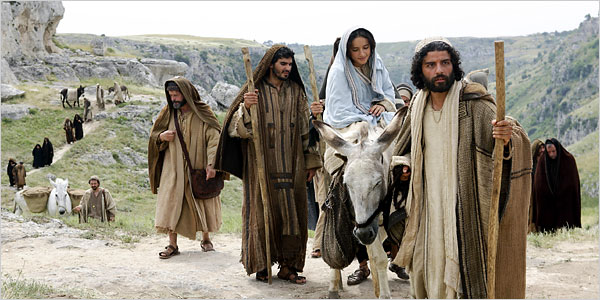Top Ten Bible Films of the Noughties
 I've been meaning to post this since around mid-December but haven't quite got to it. However, with the Oscars over a week in the past I figured it was now or never (unless I turn into one of those pedants who refuse to recognise the old decade as finishing until 31st December this year).
I've been meaning to post this since around mid-December but haven't quite got to it. However, with the Oscars over a week in the past I figured it was now or never (unless I turn into one of those pedants who refuse to recognise the old decade as finishing until 31st December this year).Before I reveal the "winning" films, there are a few notes on my selection. Firstly, I've not accounted for short films. There are a number that could have been considered, but the growth of YouTube and Vimeo mean that it's almost impossible to assess everything that might qualify under those conditions. This leads me onto my second point. I have not managed to see every Bible film that was released between 2000 and 2009. I've caught most but I'm aware of films like Corina van Eijk's Samson and Delilah, Mesih (Jesus, the Spirit of God) and even NBC's Kings which have escaped my grasp. Lastly there is always a line to be drawn between Bible films and those that reference the Bible in some way but are sufficiently well set in another time period so as to make it too much of a stretch to consider them for a list like this. Here I've decided to place the line somewhere between Son of Man (which qualifies) and A Serious Man (which, regrettably, does not).
So, without further ado, allow me to unveil my Top Ten Bible Films of the Noughties.
 Jezile (Son of Man)
Jezile (Son of Man)If, 4 years after proving a hit at Sundance Son of Man is still struggling to find a decent distributor, it's certainly not on account of its quality. Mark Dornford-May's modernisation of the Jesus story roots itself in a fictional African township which is run by corrupt officials and torn apart by violence. The unconventional treatment of Jesus' death and resurrection is only one of a number of the film's bold moves, but really the film's heart lies in its political handling of Jesus' message.
 The Real Old Testament
The Real Old TestamentWhilst he idea of filming the opening chapters of Genesis in the style of MTV's "The Real World" would probably send most filmmakers running, TROT turns out to be a work of inspired genius. Telling a 3000 year old story in the style of the 21st century's most overdone television genre strips away the pomp and piety that has become attached to these stories and lays them bare, revealing odd little details that are all too frequently glossed over. The ending might not quite live up to the opening, but reading certain parts of Genesis will never be the same again.
 The Miracle Maker
The Miracle MakerIf ever there was a film that disproved that animation is solely for children, this is it (well maybe this and that The Simpsons). Sure it works for kids, but I've been amazed that no matter how many times I return to this film I always find something new. Jesus may be played by a puppet, but this remains one of the most credible portrayals of a human Jesus, and it's also arguably the most Jewish Jesus ever to grace our screens. And the tight screen writing (which is remarkably well-versed in 1st century history) does justice to the story in a mere 90 minutes.
 The Nativity Story
The Nativity StoryRushed out to cash in on the success of The Passion of the Christ, The Nativity Story failed to find the audience of its predecessor. The opening scenes were wonderful however, depicting the gritty realism of life as a 1st century (BC) peasant, and whilst Keisha Castle-Hughes didn't perform as well as her début in Whale Rider, Oscar Isaacs portrayal of Joseph gave the film real heart. It was a shame that the earthiness of the first half of the film gradually gave way to kitschy Christmas card sentimentality, but even in spite of that The Nativity Story will feature as part of many a Christmas viewing tradition in years to come.
 Mary
MaryIt's probably an oxymoron to call something a non-canonical Bible film, but Abel Ferrara's film about a film is not really the kind of picture to fit neatly into boxes. There is some representation of the canonical gospels here, as well as an interview with a well known Biblical scholar (Elaine Pagels), but there's also a modern day tale of infidelity and redemption and the first decent portrayals of one of the canonical gospels. And if that sounds deeply confused then it's probably a fair reflection of the film itself.
 The Passion
The PassionIt had been almost 40 years since the BBC had properly dramatised the Jesus story, and whilst nothing would be quite worth that kind of wait, it was certainly a fine effort. Shown in 4 parts, The Passion offered a 'real time' look at the events of Holy Week determined to be fair to the Romans and the Jewish leaders as well as the followers of Jesus. Joseph Mawle's performance as Jesus remains one of the very best though there's some great work from the lesser characters as well. And the programme offered some refreshing new takes on the old, old story.
 The Gospel of John
The Gospel of JohnDwarfed by The Passion of the Christ looming in the background, this word for word adaptation of John's gospel did a surprisingly good job of enlivening a difficult, wordy text. It's due in part to a charismatic, if a little smug, performance by Henry Ian Cusick in the leading role, and a few flashes of brilliance from director Philip Saville. It may become a little turgid in places, and have floundered at the box office, taking the Visual Bible company with it, but there are plenty of strong moments as well. Not least the way the screenplay handles the gospel's anti-Semitic polemics.
 The Passion of the Christ
The Passion of the ChristDividing religious leaders and film critics in equal measure Mel Gibson's The Passion of the Christ proved to be one of the most controversial films of all time, and certainly the surprise hit of the decade. It's easy to scoff, or to take offence at the subject matter, but there's much to admire in Gibson's film from the bold use of Aramaic to the Caravaggio-esque cinematography. And whilst those who find the film distasteful may have some valid points, what other film could unite Quentin Tarantino and the Pope?
 The Apocalypse
The ApocalypseEasily the least defensible choice on my list, not least because of a tagged on love story and poor (and by now dated) CGI. But at the same time it's one of the few films about Revelation to rely on the story's likely, historical context instead of the spectacular / bizarre.
 Who Wrote the Bible
Who Wrote the BibleThe noughties were the decade where documentary films began to emerge into the mainstream so it's more than fitting to include one on this list. Robert Beckford's controversial look at the authorship of the Bible challenged both those clinging to the traditional takes on the writers of the Bible and those who would disregard it completely. The documentary would spawn a string of films presented by Beckford which presented thoroughly 21st century takes on Christianity, unafraid to question and adopt alternative theories but rooted in belief nevertheless.
So over to you. What would you have included and what do you think I'm wrong to include?
Labels: Lists














2 Comments:
At 2:16 am, March 18, 2010, EegahInc said…
EegahInc said…
Happy to see the Miracle Maker get some love. I'm probably going to have to replace my disc soon as it's so worn out by now.
At 1:11 pm, March 26, 2010, Prince Bollywood Movie said…
Prince Bollywood Movie said…
I have watched most of these movies. Really very well directed and taken. Good and thought provoking.
Regards,
Prince Bollywood Movie
Post a Comment
<< Home